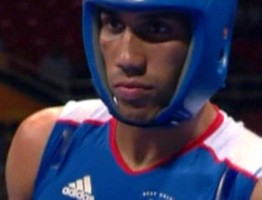 By Jason Kim: James DeGale, the former 2008 Olympic Gold Medalist in the middleweight division for Britain in Beijing, will be making his appearance as a professional on February 28th against 21-year-old Georgian Vepkhia Tchilaia (9-8, 5 KOs) at the National Indoor Arena, in Birmingham, West Midlands. DeGale, 23, now promoted by Frank Warren, has big goals for himself in the future, namely becoming the champion of the world at some point. However, at only 23, he still has a ways to go before he gets to that point and will look to take things slow for awhile and build up to stiffer competition.
By Jason Kim: James DeGale, the former 2008 Olympic Gold Medalist in the middleweight division for Britain in Beijing, will be making his appearance as a professional on February 28th against 21-year-old Georgian Vepkhia Tchilaia (9-8, 5 KOs) at the National Indoor Arena, in Birmingham, West Midlands. DeGale, 23, now promoted by Frank Warren, has big goals for himself in the future, namely becoming the champion of the world at some point. However, at only 23, he still has a ways to go before he gets to that point and will look to take things slow for awhile and build up to stiffer competition.
Tchilaia has lost six out of his last seven fights in the past three years since starting his career with an eight fight winning streak. Tchilaia has been knocked out in three of those fights by light competition. It would figure that Tchilaia has a good chance of being knocked out on February 28th, even though DeGale wasn’t known for being a big puncher while fighting as an amateur.
DeGale has been at the center of controversy before even firing his first punch as a pro due in part to the criticism that has been leveled at him from fighters like Joe Calzaghe and David Haye, both who feel that DeGale possibly doesn’t have the right ingredients to make it as a professional boxer. Perhaps the reason for this is DeGale’s tendency to slap with his punches, fight off his back foot, move a lot and throw pot shots. However, having seen all of DeGale’s Olympic fights, I think DeGale has more than enough talent to make it as a professional and and possibly win a title or two before he’s through.
DeGale looked exceptional in the Olympics, beating Mohamed Hikal (Egypt) 13-4, Shawn Estrada (USA) 11-5, Bakhtiyar Artayev (Kazakhstan) 8-3, Darren Sutherland (Ireland) 10-3 and Emilio Correa (Cuba) 16-14 for the Olympic Gold Medal. The Correa fight was a very close fight, with Correa rallying in the 2nd round after losing the 1st round by a 6-1 score. DeGale, looking tired from the heavy pace that Correa set in the fight, held constantly in the 2nd and 3rd rounds, and was deducted two points for holding in the 3rd.
By the end of the 3rd, DeGale was up by a score of 12-10 and looking to be losing control of the fight. Correa was able to back DeGale up often in the 2nd and 3rd rounds, catching him on the ropes and landing fast and powerful flurries before DeGale had time enough to grab him in a clinch. Correa became increasingly upset with DeGales’ constantly clinching and began to rough DeGale up on the inside while being clinched, hitting him and roughly bullying him around.
In the 4th, both fighters exchanged blows, trading point for point and fighting to a near standstill. Though the Cuban was the clear aggressor and stronger fighter in the action, DeGale was very slick, catching Correa often as he would come charging in. DeGale quickly added two more points to his score and led by 14-12, at which point he began running out the clock by moving around the ring and avoiding Correa’s fierce charges.
The crowd hated it, booing loudly and wanting him to stop and trade. However, DeGale continued moving and clinching often until he ran out the clock and won the Gold medal.
The big question with DeGale is whether he has the size or the power to compete with the bigger, stronger middleweights in the division. He tends to slap with his punches and fight on his back foot, moving often. However, he has very quick reflexes, is hard to hit and is an excellent counter puncher.
In a four round fight as an amateur, he’s very difficult to hit with power shots with any regularity. But over a 10 to 12 round fight, his opponent will have more opportunities to land big shots if he’s not able to move as often as he did as an amateur.
Comments are closed.